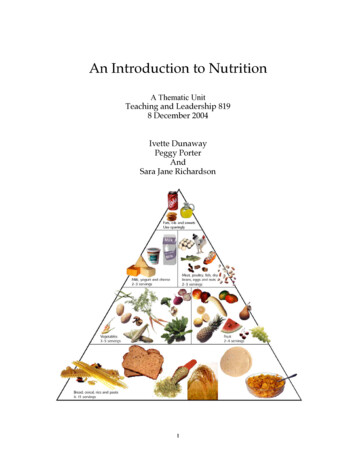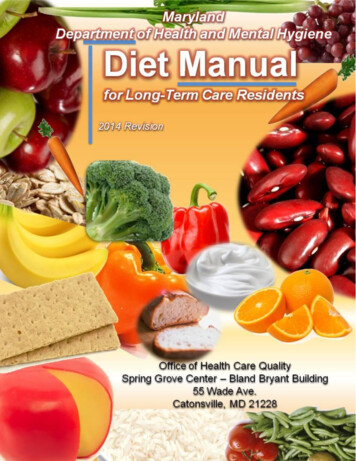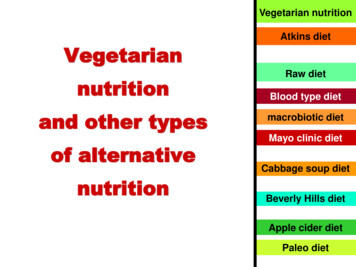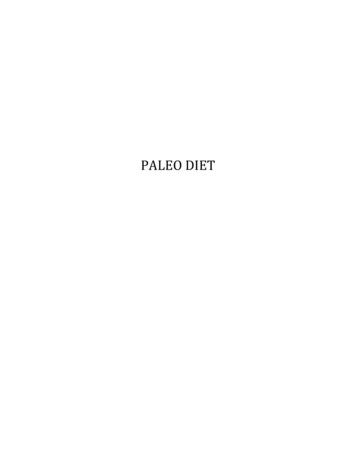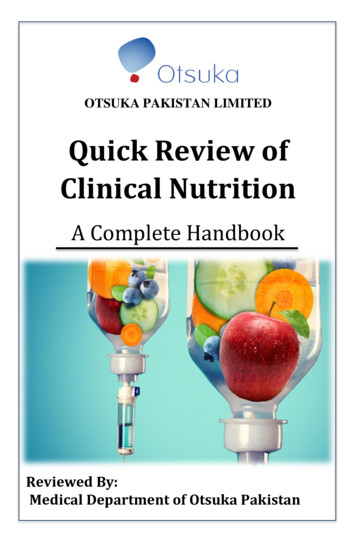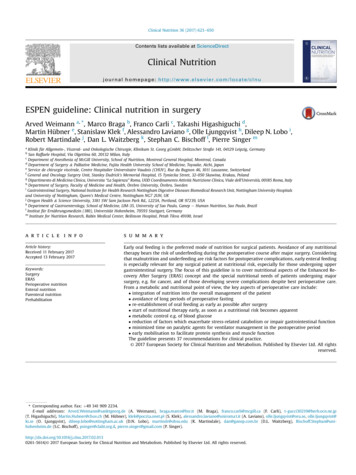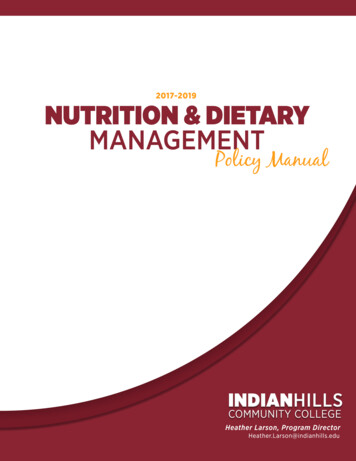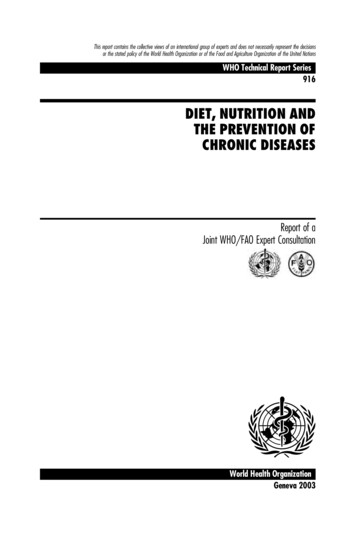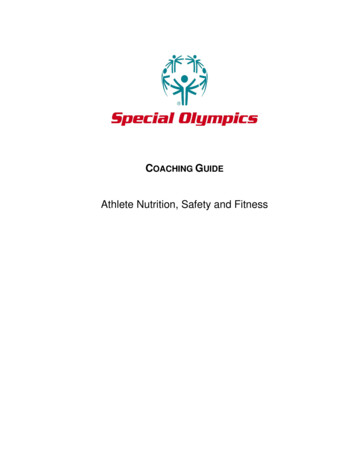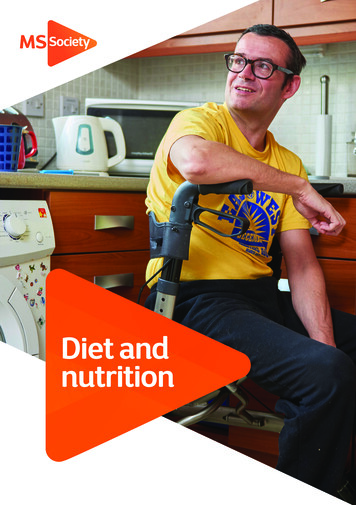
Transcription
Diet andnutrition
We’re the MS Society and we’re here foryou. Funding world-leading research,sharing information, making voices heardand campaigning for everyone’s rights.Together we are a community. And togetherwe will stop MS.We rely on the generosity of people like you to fund our vital work.If you would like to make a donation, you can do so by: Calling us on: 0300 500 8084.Lines are open Monday to Friday Visiting us at: mssociety.org.uk/donate Posting your donation to: MS Society, National Centre,372 Edgware Road, London NW2 6ND. Please make chequespayable to the ‘MS Society.’2 Diet and nutrition
ContentsA word from Yasmin, who has MS4Five things to know5About this booklet7Is there an MS diet?8Vitamin D13Calcium16Essential fatty acids18Vitamin B1220Antioxidants22Special diets24Can my diet helpwith my MS symptoms?35If MS symptoms affectyour eating and drinking39Preparing meals41Managing your weight46Useful organisations49New words explained51Further information54
A word from Yasmin, who has MSBeing diagnosed with anunpredictable and incurablecondition like MS can leave youfeeling powerless. It certainlydid with me.When I heard diet could help withMS symptoms I assumed thatthis would be a ‘special’, unusualand probably expensive diet. Butthe reality was just to eat goodnutritious food and include lotsof vegetables. With this in mind,we get a weekly veg box deliveredto make sure we have a supplyof fresh produce to cook with.I recently completed an OpenUniversity degree and believe thateating healthy food helps whentrying to study.This booklet has some helpfulinformation on how to manageyour MS symptoms by makingchanges to your diet. I try to eatsmaller meals more often to helpme feel less tired and I alwaysmake sure I drink enough liquids.I often feel I’m easily dehydrated,4 Diet and nutritionand drinking a lot of fluids helpsme feel better. I feel it also helpsfight off any infections.The impact that the food youeat makes on your ‘brain health’is undeniable and not only forpeople with MS but for anyone.But for people with MS, eatingwell is another way to take controlof your condition. Chronic illnesstakes so much away from aperson’s life, but being able to eatand share good food with friendsand family gives back some ofwhat has been lost.
Five things to know1Aim for a balanced diet so you get enough of themain nutrients: carbohydrates, fats, proteins, vitaminsand minerals.2There isn’t an ‘MS diet’ that’s been proven to help treatmultiple sclerosis. And some special diets, like The Swank,McDougall, Paleo or Best Bet, cut out certain foods, so ifyou try them, be careful not to miss out on vital nutrients.3A balanced diet and healthy weight, could help youmanage your MS.4Make a plan for your diet that helps your own personalneeds - to help with fatigue, the bladder or bowel,swallowing difficulties or keeping a healthy weight.5If you need help with meals - with planning, shopping,preparing or clearing up - ask your GP or MS nurse foran occupational therapist assessment and a referral to adietitian. They can help make sure you can get a good diet,and help you eat healthily within your budget.Diet and nutrition 5
About this bookletEating is more than justsomething we need todo. It’s something to beenjoyed – it can be a funsocial activity, a culturalexperience and somethingto make you feel good. Anda healthy diet that suitshow you live can make adifference to how you feel.In this booklet we describe thekind of healthy diet that mostpeople should aim for – one thathas a balance of different kinds offoods.We’ll also talk about some of theclaims made for special diets forMS. We look at the evidence, tohelp you make up your own mindabout what you choose to eat.Because MS symptoms cansometimes affect what you eatand how you prepare meals,we’ve got tips on planning,preparing, and clearing away.There’s information too on otherorganisations that can help withissues around food and eating.See ‘Useful organisations’ onpage 49.And if you’re keen to stay as fitand healthy as possible, ourwebsite’s got lots of informationabout exercise and support forstaying active, including videosyou can use at home:mssociety.org.ukCall the MS Helpline to see howour Physical Activity supportservice can encourage your effortswith activity, diet and stoppingsmoking: 0808 800 8000One last thing. Where you seea word in bold in this booklet, itmeans you can turn to the backand find it explained in moredetail.Diet and nutrition 7
Is there an MS diet?For most people with MS, thebest diet is a healthy, variedone. And lots of people withMS say that when they eatwell, they feel better.Some people with MS say thatfollowing a specific diet has madea difference to how they feel. Forexample, they might feel the diethas reduced how many relapsesthey get, or that it’s improved theiroverall quality of life. But otherpeople don’t feel this way.Researching diet is very difficult,and at the moment there’s notmuch scientific evidence that anyspecial diets affect the way MSdevelops. But a healthy balanceddiet can help guard against otherissues, like heart disease andstrokes.If you feel better eating a certainway, it could be a change that worksfor you. The important thing is tomake sure you’re not missing outon the healthy nutrition you need.8 Diet and nutritionWe look at some of the morepopular diets that are suggestedfor MS in ‘Special diets’ on page 24.What should I eat if I’vegot MS?Aim for a healthy, balanced diet.That’s one that gives you the rightamounts of different kinds ofnutrients: Proteins for growth andtissue repair Carbohydrates for energy Fats for energy, to help yourbody absorb certain vitamins,and for essential fatty acids Fibre for healthy digestion andregular bowel movement Vitamins and mineralsessential nutrients needed foryour body to work properly,including tissue repair, bonestrength and for absorbingother nutrients
Fluids so the body can work atits best. Water carries nutrientsaround the body and is usedin the chemical processes thathappen in our cellsThe NHS uses the Eatwell Guide toshow the different portions theyrecommend for a balanced diet.You can find it at nhs.uk as well ason national government websites.Our diet is made up of lots ofdifferent nutrients, not one thingor another on its own. So we haveto think about diet as a whole.But some MS research haslooked at particular nutrients andon pages 13 to 23 we look atvitamin D, calcium, essential fattyacids (including omega-3), vitaminB12, and antioxidants.How can a balanced diethelp?A balanced diet combined withexercise can help you stay in thebest health possible. For example,it can help you keep a healthyweight and feel less tired. It canalso help you have regular toilethabits, and keep your bones,muscles, teeth and gums healthy.The same balanced diet, withexercise, can help cut your riskof getting heart disease, stroke,osteoporosis and certain cancers.And it can help keep your skinin good condition, to protectit against getting sore anddamaged. This could be importantif you spend a long time sitting orlying down.Who can help with diet andnutrition?GPs, dietitians and occupationaltherapists can all help with diet andnutrition. They can help with whatyou eat and how you prepare it. Forexample: Your GP can tell you moreabout healthy eating, andmost surgeries will haveinformation leaflets you cantake home. You can ask themfor a referral to a dietitian. A dietitian can help if you haveany particular nutritional orenergy needs – for example, ifyou have a constant tremor, orDiet and nutrition 9
you’re underweight, or if youhave symptoms or anotherhealth condition which mightaffect your diet. A dietitian canalso help you plan your mealsso that you’re getting all thenutrients you need. An occupational therapist canhelp you find easier ways toprepare food, perhaps to saveenergy or to manage a tremor.For more information aboutgetting a healthy diet and howto find a dietitian, visit the NHSwebsite for your nation.“All we can do iseat a healthy,balanced diet. If you’relow on somethingthen pop thosesupplements. I’msticking to eatingveggies like my mumordered.”Mel10 Diet and nutritionShould I take vitamin ormineral supplements?If you’re eating a balanced dietthen you should be gettingenough of most vitamins andminerals through your food.Research suggests this is the bestway to get the nutrients you need,rather than through supplements.But there could be reasons youmight need to take supplements.For example, everyone shouldconsider regular vitamin Dsupplements (see page 14).Some neurologists test theirpatients with MS to check theirvitamin D levels. If these are low,they can prescribe supplements.There’s more about vitamin D onpage 13.If your energy needs are very lowand you don’t eat very much, youmight not get enough of certainvitamins and minerals.But speak to a health careprofessional if you think youmight need to take supplements.If you do take them, rememberthat too much of certain vitamins
or minerals can sometimes beharmful. There’s more aboutvitamins and minerals on theNHS Choices website, includingrecommended safe levels.Are there foods I should avoid?There’s very little evidence thatremoving certain foods from yourdiet is a good way to treat yourMS. A healthy, balanced diet wouldmean you’re not getting too muchof any particular kind of food.But people with MS can react tocertain foods, just like anyoneelse. If you think you have anallergy or intolerance, speak toyour GP who can help you to lookinto it further. The charity AllergyUK has more about the signsof allergies and intolerances atallergyuk.orgCan I drink alcohol if I’vegot MS?You don’t have to give up alcoholbecause you’ve got MS. Therehasn’t been much research intoalcohol and MS, but the evidencedoesn’t suggest it makes MSworse in the long run.Of course, alcohol can have allsorts of effects of the body, whichcould make MS symptoms worse.For example, some people withMS say it makes their balance andcoordination worse. It can alsoirritate your bladder and affectyour sleep. As with people whodon’t have MS, the short-termeffects of what you drink varyfrom person to person.Alcohol can interfere with somemedications. Your GP, pharmacistor MS team can tell you if you ifthat’s the case for anything you’represcribed.The NHS has guidance on alcoholfor all men and women. It saysthere’s no completely safe levelof drinking, but sticking withinthe guidelines lowers your risk ofharming your health.They advise people to drink nomore than 14 units a week, and tospread that over 3 or more days,not all in one or two days. As aguide, a pint of 5.2% alcohol beeris 3 units. A bottle of 13.5% wine is10 units.Diet and nutrition 11
Coffee and MSYou don’t need to stop drinkingcoffee because you’ve got MS.Some research suggests coffeemight even have health benefits,including reducing the chance ofheart disease.One study into coffee andMS found that people withrelapsing forms of MS who drankcoffee every day had a slowerdevelopment of symptoms thanthose who never drank coffee. Butthe evidence isn’t strong enoughto recommend everyone withrelapsing MS drinks coffee. Andwe also don’t know how muchcoffee might be the best amountto drink if it does have benefits.healthy for most people. If you’repregnant, the NHS recommendsyou drink no more than 200mgof caffeine a day. That’s about 2coffees.Does salt affect MS?Research hasn’t shown a linkbetween the amount of salt weeat and MS. It doesn’t seem toaffect the risk of developing MS,or influence how quickly MSprogresses.But eating a lot of salt is linked tohigh blood pressure, heart diseaseand stroke, so it makes sense tokeep it to less than 6g a day. That’sabout a teaspoon of salt and it’sthe recommended upper limit foradults in the UK.We do know drinking too muchcoffee can have side effects likenervousness, irritability andstomach upset. And coffee andother drinks with caffeine in themcan make you need the toiletmore often and affect your sleep.We need a bit of salt in our diet,but lots of the foods we eat, likebread, cereals and ready meals,already contain salt so it’s oftennot necessary to add salt to yourmeals.The effects of caffeine vary fromperson to person, but 4 cups aday would seem to be completely12 Diet and nutrition
Vitamin DVitamin D keeps your teeth,muscles and bones healthyand it plays an important rolein your immune system.Most people get the majority oftheir vitamin D from sunlight. It’smade by our bodies when thesunlight shines on our skin. It’salso available in smaller amountsin food.Good food sources of vitamin Dinclude oily fish, such as salmonand sardines, fortified breakfastcereals, and eggs. Small amountsare also found in margarine andfull-fat milk.But it’s almost impossible toget all the vitamin D you needthrough diet alone.Is there a link betweenvitamin D and MS?There does seem to be a linkbetween vitamin D and MS.We get about 80-90% of ourvitamin D from the sun. And thereare more people with MS in areasfurther away from the equatorwhere there is less sunshine. Soresearchers have looked intopossible links between vitamin Dand the risk of developing MS.Studies show that if you don’t getenough vitamin D when you’rea child this could play a role inyour chances of developing MS.Other research shows that peoplewho naturally have low vitamin Dlevels because of their genes aremore likely to develop MS.There’s some evidence thatlevels of vitamin D in the bodymight affect how someone’s MSdevelops.But at the moment it’s not clearthat increasing vitamin D (throughsupplements, for example) canhelp manage MS. If it could, it’simportant to also find out the bestdose, and if it could help certainpeople more than others.Diet and nutrition 13
You can keep up with the latestresearch on our websitemssociety.org.uk/researchShould I take a supplementto get enough vitamin D?If you live in the UK, you probablydon’t get enough vitamin Dthrough diet and sunshine alone,particularly in the darker months from October to the end of March.The UK government’s ScientificAdvisory Committee on Nutritionrecommends that everyone in theUK considers taking a supplementto make sure they’re gettingenough vitamin D.For anyone who’s 1-year-oldor over, they recommend10 μg (micrograms) /400 IU(international units) a day.These recommendations are forthe population as a whole, to helpkeep bones and muscles healthy.All 4 UK governmentsrecommend some people takethis supplement all year,including if you:14 Diet and nutrition don’t get outdoors much always cover up in the sun are from a minority ethnicgroup with dark skin, such asof African, African-Caribbeanor South Asian originSome neurologists suggestpeople with MS should takehigher doses than other people,all year round.If you’re concerned about yourvitamin D levels, ask your MSteam about getting a blood test.And speak to your MS teambefore taking high doses. Toomuch vitamin D could causeserious health problems.The Association of BritishNeurologists says women withMS of child-bearing age shouldtake a vitamin D supplement.Speak to your neurologist abouthow to take this supplement andat which dose.
CalciumCalcium is vital for keepingbones strong. It also helpsmuscles to work properly.How do I get calcium intomy diet?Milk and dairy products –including yoghurt and hardcheeses such as cheddar andedam – are the richest sources ofcalcium.Tinned sardines and pilchards(where the bones are eaten), bread(particularly white), tofu, greenleafy vegetables, baked beansand other pulses, certain nuts andseeds (tahini, almonds, brazil nuts,hazelnuts) plus dried figs are alsogood sources.Calcium-enriched soya products,such as milk, yoghurts or cheeses,are also available.Skimmed milk contains as muchcalcium as full-fat, so you can cutdown on fat without losing out oncalcium.16 Diet and nutritionCalcium and vitamin DAs well as getting plenty ofcalcium, you should also makesure you’re getting enoughvitamin D, as it helps your body toabsorb calcium. Low fat productscontain less vitamin D than full fatversions.If your MS team recommends youtake a high dose of vitamin D, theymight also suggest you shouldhave a low calcium diet. That’sbecause occasionally, very highdoses of vitamin D cause calciumto build up in the body anddamage the kidney.How much calcium do I need?The recommended amount ofcalcium each day is 700 mg. Thisis about the same as a pint of milk,or two to three portions of dairy,such as a yoghurt or matchboxsized piece of cheese.
Should I take supplementsfor bone health?If you’re prescribed a course ofsteroids, or if you’re less mobile,a health care professional mightsuggest calcium supplements tostrengthen your bones. If you’reworried you’re not getting enoughcalcium or vitamin D, talk to yourGP about whether supplementsare good for you. To find out ifyou have enough calcium in yourbones, you’d need a scan to checkbone mineral density.HealthybonesOsteoporosis causes bones to become more fragile andmore at risk of breaking. It’s not a symptom of MS, but peoplewith MS might be at a higher risk of developing osteoporosisbecause of: long courses of steroids, used to treat relapses a lack of weight-bearing exercise (where your feet and legssupport your weight) lack of sunlight, perhaps because of heat sensitivity or inabilityto get out of the house, leading to lower vitamin D intakeMS symptoms like balance problems can also make people morelikely to have falls or break bones. So bone health is important.Keeping up good levels of vitamin D and calcium can help reducethe risk of osteoporosis, as these both help keep your bonesstrong and healthy.Diet and nutrition 17
Essential Fatty AcidsEssential fatty acids (EFAs)are types of fat that thehuman body needs for goodhealth. You might also hearthem called polyunsaturatedfats or even PUFAs(polyunsaturated fatty acids).Many polyunsaturated fatsin our diet are EFAs. Thereare two main groups of EFAs:omega 3 and omega 6.EFAs have important jobs to do inthe central nervous system (thebrain and spinal cord). We needthem to produce hormone-likesubstances, called prostaglandinE2 and prostaglandin E3.These work together when yourbody reacts to inflammationand the immune system goes towork. EFAs are needed to makeand repair myelin - the protectivelayer around nerve fibres that getsdamaged in MS.18 Diet and nutritionThe research evidence for EFAsaffecting MS is mixed. Overall,it’s not clear that they can reducerelapses or progression in MS.But there’s no doubt that they’reimportant for the immunesystem.Our bodies need a certain amountof fat for a healthy balanced diet,so it makes sense to get that fromEFAs rather than saturated fatswhich we know can be bad for us.How do I get EFAs in my diet?Sources of omega 3 EFAs include: oily fish, including sardines,mackerel, salmon and freshtuna certain nuts, seeds and beansincluding walnuts, linseedand soybeansSources of omega 6 EFAs include: certain seed and vegetable oilssuch as sunflower, safflower,rapeseed, soy and corn oil
food made from the aboveoils including margarine,salad dressings andmayonnaiseShould I take an omega 3supplement?Research hasn’t shown clearbenefits for MS from omega 3supplements.Generally, omega 3 supplementsare safe. But they might affecthow some medicines work, andvery high doses could be harmful.Your doctor or MS team can tellyou if any of your medicationsmight be affected by omega 3supplements, and check the doseis safe for you.normally have a typical UK diet,you could try to aim for moreomega 3 EFAs.EFAs still contain the sameamount of calories as other typesof fat so, while they might bebetter for your health, it’s best notto eat too much. More researchis needed to find out the idealintake.If you’re pregnant, you shouldavoid supplements which alsocontain vitamin A, like cod liver oil.How much do I need?A good balance of omega 3 andomega 6 may be more importantthan the total amounts of each.The typical UK diet is probablytoo rich in omega 6 and not richenough in omega 3. So if youDiet and nutrition 19
Vitamin B12The link between vitaminB12 and MS is not clear.But vitamin B12 does haveseveral important functions,including an important rolein the nervous system.The body needs vitamin B12 tomake myelin – the protectivelayer around nerve fibres that getsdamaged in MS. And vitamin B12deficiency can lead to symptomssimilar to MS. So it makes sense toinclude foods rich in vitamin B12 inyour diet.How do I get vitamin B12 intomy diet?Vitamin B12 is found in animalproducts, including meat, fishand dairy. Look for breakfastcereals that are ‘fortified’ withvitamin B12. Yeast extract such asMarmite can be a good source ofvitamin B12 if you are vegan.20 Diet and nutritionShould I take vitamin B12supplements?Most people get enough vitaminB12 in their diet, but some peopledon’t take in enough of it. This ismore likely if you’re vegetarian,vegan or following a special dietwithout animal products.Some people with MS might notbe able to take in enough of it evenif they include lots of vitamin B12 intheir diet.If you’re concerned about yourvitamin B12 levels, speak to yourGP who can carry out a blood test.Research hasn’t shown any benefitin taking supplements if you haveenough vitamin B12.
AntioxidantsOxidants, or free radicals,are chemicals that reacteasily with other substancesin the body. They changeor damage their structure.Some vitamins – includingvitamin A, C and E – canlimit the damage oxidantscause. So they’re knownas antioxidants.One small study funded by theMS Society suggests antioxidantscalled ‘flavonoids’ might helpwith MS fatigue. In the research,they used hot chocolate. Darkchocolate (over 75% cocoa) is veryhigh in flavonoids. You can alsofind flavonoids in other foods, likefruit and vegetables. They’re oneof the things that give fruit andvegetables their different colours.Are they linked with MS?This was a small study, and moreresearch is needed to understandexactly how flavonoids and otherantioxidants might benefit peoplewith MS.Some research tells us thatoxidants might be linked to thedamage that happens in ourcentral nervous system with MS.But there have been few studiesinto the use of antioxidantsfor people with MS and thesignificance is still unclear.In theory, antioxidant therapycould make the effects of MSworse, as some antioxidantshave a stimulating effect on theimmune system – although thelevels found in a balanced dietwould not cause a problem.22 Diet and nutritionHow do I get antioxidantsinto my diet?Brightly coloured fruit andvegetables – red, orange, greenand yellow – are the bestsource of antioxidants. Thesefoods also contain other nutrientsour bodies need.Aim for at least five portions a day,choosing a variety of types
and colours. Dark chocolate (over75% cocoa) is high in flavonoidantioxidants. But remember tocheck how much sugar is also inthe chocolate.Should I take supplements?your food without the need forsupplements. If it’s hard for you toeat fruit and vegetables or yourdiet is particularly limited, speakto a dietitian about whether takingsupplements would be good for you.If you’re eating a balanced dietthen you should be gettingenough antioxidants through‘Good’bacteriaIn recent years, scientists have shown connectionsbetween the bacteria in our gut (our stomach andintestines) and the way the rest of our body works. This couldinclude a link with MS and other conditions. The bacteria, andother tiny organisms, make up what’s called the gut ‘microbiome’.Together they influence our immune response and centralnervous system. This is a very new area of research and at themoment we don’t know exactly how the gut might affect MS,or if our diet could change that. But eating a variety of fruit andvegetables might help encourage a healthy balance of bacteria.A large study involving people with MS is already underway to findout more. You can read more about this emerging research on ourwebsite mssociety.org.uk/researchDiet and nutrition 23
Special dietsOver the years, manyspecial diets have beenpromoted to help withMS. These include low-fat,allergen-free, gluten-free,pectin-restricted, low-sugardiets, and diets that cut outprocessed food. Many peoplewith MS say that followinga special diet gives them afeeling of control over theirMS. Some say that followinga special diet makes themfeel better and helps withtheir symptoms, but that’snot the case for everyone.Some special diets recommendchanges which could havebenefits for overall health, such asreducing saturated fats, or eatingmore vegetables – both generallyrecommended as part of ahealthy, balanced diet. But theycan also include restrictions whichmight be unhealthy, or make ithard for some people to stick to.24 Diet and nutritionIt’s difficult to carry out researchinto diet and MS, and at themoment there isn’t enoughevidence to recommend anyspecial diet for people with MS.What we know about diet ingeneral shows that it’s importantto get a balanced nutritionalintake, instead of avoidingcertain foods.If you do decide to try a new diet,it’s important to make sure youstill get enough energy and all thenutrients you need. If you cut outcertain food types, make sure youfind ways to get the nutrients youneed to stay healthy and avoidmalnutrition. Malnutrition cancause fatigue and make your MSsymptoms worse.Before making big changes, askyour GP for a referral to a dietitian.They can help you check you’ll getthe nutrition you need. Like anylifestyle change, there are lots ofthings you might want to considerbefore choosing to follow one ofthese diets, including:
What’s the evidence? Can you still enjoy your food? Is it good for you? How practical is it?What’s the evidence?What’s the evidence behind thediet? Does it make extravagantclaims about how it will help yourMS? Are these claims backed upby science?‘Personal stories’ are just that– everyone’s MS is different.So it’s difficult to know if anyimprovement is because of thediet or because of the way MSsymptoms sometimes vary. Andwhat helps someone else won’tnecessarily help you.Can you still enjoy your food?Food is about more than justmaking sure your body gets thenutrients it needs. Can you stilleat your favourite foods whilefollowing the diet? If you enjoyeating meals in restaurants orwith others at home will you stillbe able to?“I’ve eatenporridge forbreakfast nearlyevery day for over20 years and wouldlove to believe thatit’s the reason whymy MS is fairly tame.But I know that inreality, althoughporridge is good, inmany ways it’s notmagic.”DaffHow practical is it?Think about how a diet fits intothe way you and your householdlive. For example, lots of diets askyou to prepare each meal fromfresh ingredients. Do you havethe time, energy and moneyfor that? If the diet suggestssupplements, are they expensive?Don’t feel bad about changingthings if a very strict diet becomesmore of a chore than a positivechoice. We all know food is morethan the nutrients it contains – it’sa big part of everyday life.Diet and nutrition 25
Is it good for you?Paleo diets limit dairy, grains,pulses, potatoes and processedMake sure you can get enoughenergy from the diet. For example, food.if you have ongoing tremor orThe Wahl’s diet is based on ayou’re underweight, you mightPaleo diet, and it’s part of what’sneed extra energy. If you limit thecalled the Wahl’s Protocol. Thiskind of food you eat you mightcombines the diet with vitamins,find you lose weight and youmeditation, and exercise. Therecould become malnourished.are also newer versions of theWahl’s diet, including a ketogenicCan you still get a proper balance(keto) diet. The Wahl’s diet isof all the nutrients you need? If anamed after Terry Wahls, andiet cuts something out, what’sAmerican doctor who has MS.the healthy alternative for thosenutrients?Do they help with MS?Before you make any majorchanges to your diet, speak withyour doctor or nurse, particularlyif you have any other healthconditions as well as MS.There’s been little research into aPaleo diet or the Wahl’s Protocoland MS. At the moment, there’sno clear evidence to suggest theyhave benefits for people with MS.Paleo diets andthe Wahl’s protocolIn 2021, we expect results tobe published from a study thatcompared how a Wahl’s diet andthe Swank diet (see page 29)might affect MS fatigue. You cankeep up to date on our websitemssociety.org.uk/researchPaleo diets are based on foodsthat are thought to have beencommon in the Paleolithic era,before humans started farming.So they include meats, fish, nuts,vegetables and fruit. The idea isthat our bodies are best adaptedto eating these kinds of foods.26 Diet and nutrition
Are they healthy?Following the Paleo diet wouldn’tgenerally be considered badfor you, although you’d have tomake sure you were getting allthe nutrients you need. Currentevidence around good dietsuggests that we should be eatingnutritionally balanced diets, socutting out whole groups of foodssuch as dairy, wholegrains andpulses is restrictive.Cutting out cereals and dairycould mean you miss out onsome B vitamins, vitamin Dand calcium. And if you havehigh energy needs or you’reunderweight, excluded foodsmight make it harder to get theenergy you need.The large amounts of meatrecommended are higher thancurrent health advice on howmuch meat you should eat - andcould also make it expensive.The Wahl’s diet doesn’tcompletely cut out all of the samefoods as other Paleo diets do, butyou should still check you get allthe nutrients you need.“I think diet isvery importantfor us MSers, butthe key is to tailorit to meet your ownrequirements. We’reall different.”HeatherIntermittent fastingand keto dietsIntermittent fasting puts strictlimits on calories some of thetime, with the usual caloriesallowed the rest of the time. Forexample, it could mean cuttingwhat you eat to just 500 caloriesfor 2 days every week. On theother days, you’d eat yournormal amount.
They can help make sure you can get a good diet, and help you eat healthily within your budget. Make a plan for your diet that helps your own personal needs - to help with fatigue, the bladder or bowel, swallowing difficulties or keeping a healthy weight. A balanced diet and healthy weight, could help you manage your MS. Diet and nutrition 5
